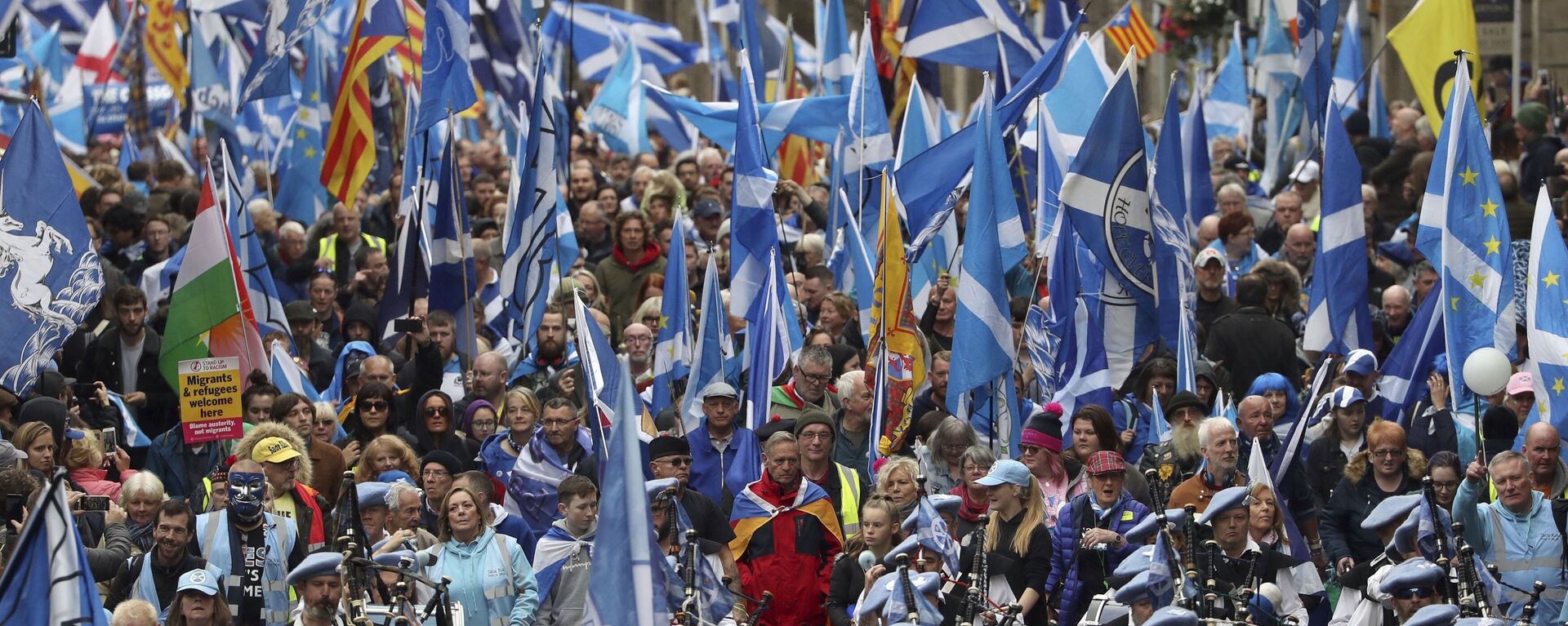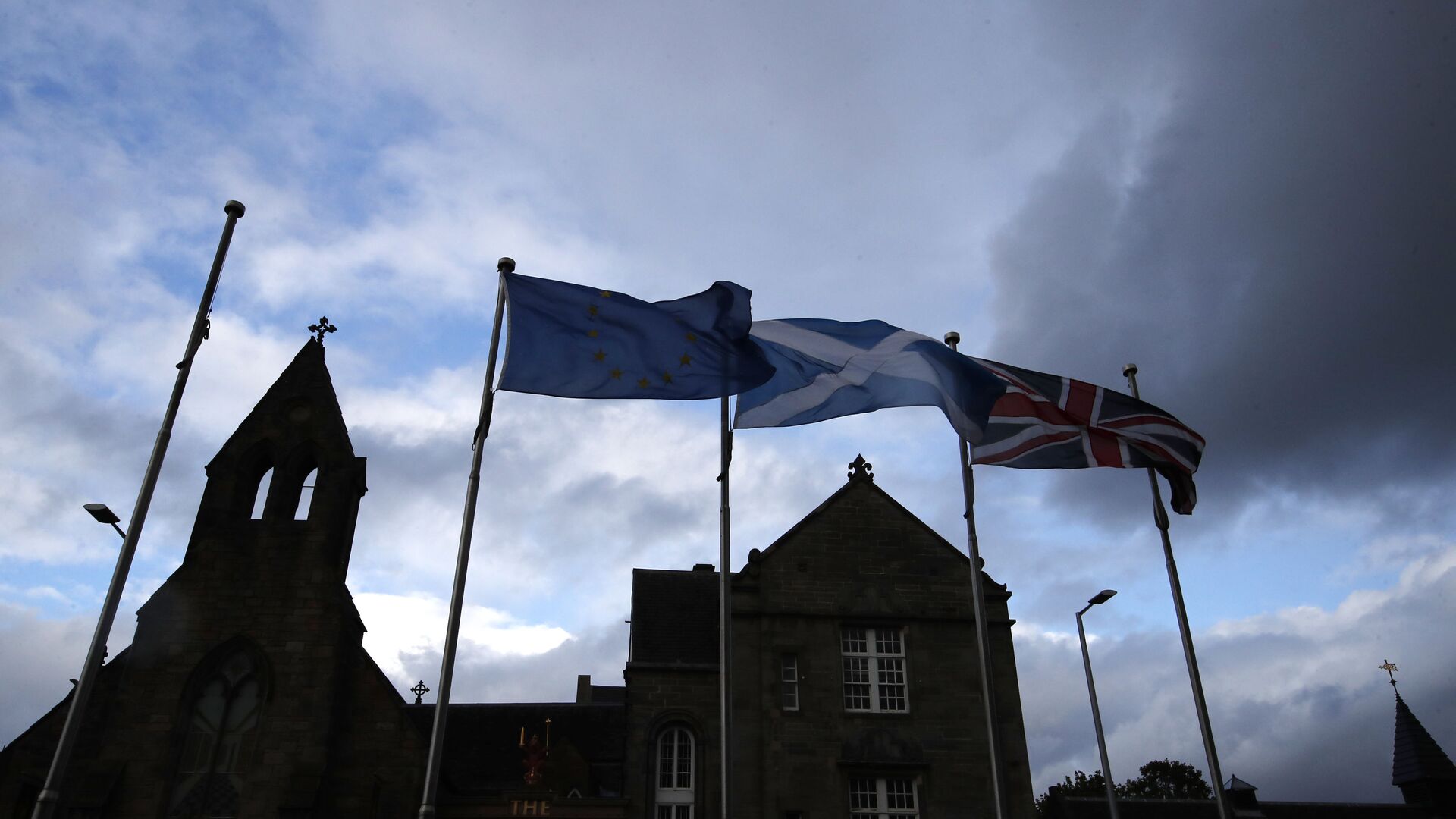Sir John Curtice, professor of politics at Strathclyde University and president of the British Polling Council, believes that the push for Scottish independence could have dwindled due to the erosion of support among "softer" backers of the country's sovereignty.
Sputnik: A new poll found that most Scots would vote to remain in the UK if an independence referendum were held tomorrow. This contradicts the rhetoric of the last year when more than 50% of the population leaned toward supporting the country's withdrawal from the UK. What has changed, why has public opinion reversed?
John Curtice: Well, there's been a couple of polls published over the weekend. One said yes 50-no 50. The other had yes now already ahead, although there's some arguments about the methodology, about the way that poll’s been reported. In any event, leaving aside those details, the truth is that support for independence has been showing signs of falling back probably pretty much since the turn of the year. And it looks as though the most likely explanation is that some of the softer elements of independence support, which did get to the remarkably high level of around 53 percent on average, may have eased during the course of recent weeks, not least part simply because we're now getting close to an election, an election will take place in two months’ time. And it looks as though some of those people who perhaps were always the least solid supporters of independence, people who have voted for others parties in the relatively recent past, those who are not so concerned about Brexit. It's amongst this group that some of the support seems to have fallen away. And in truth, it may well be something that perhaps was almost inevitable given the very high levels which it had got.
Sputnik: The survey was released right after the SNP row - how much do you think internal tensions within the party have impacted public opinion?
John Curtice: There is no doubt that the debate, if that's the right word, between Alex Salmond and Nicola Sturgeon, i.e., the allegations that Alex Salmond has made about Miss Sturgeon's conduct of the harassment complaints against him, which resulted in two very lengthy parliamentary inquiry sessions, it's certainly not doing the SNP any good. Slightly more difficult it is to discern whether or not the last couple of weeks as opposed to the last couple of months have made a significant impact. So, I mean one way of looking at it is that the last poll to be conducted immediately before Mr Salmond appeared before the parliamentary committee said, yes 50-no 50, and one of the first polls to be conducted thereafter says yes 50-no 50. Probably the truth is, again it comes back to this soft underbelly of SNP support, but for the most part around 75-80 percent of people who voted for the SNP in the past basically feel that Nicola Sturgeon has been telling the truth, and are more inclined to believe Ms Sturgeon than Alex Salmond. But there [...] are people who say, well, actually, I'm not sure Nicola Sturgeon has been telling the truth, I now don’t quite think so much of the SNP and perhaps some of those have indeed moved away from the SNP. So, I certainly don't think it's done any good. However, most SNP voters still seem to be on, but, of course, you don’t have to lose very many voters for your support to be falling back by the kind of two or three points that we've been seeing in the polls.
Sputnik: How has the perception of post-Brexit life changed in Scotland, especially given the global pandemic and EU's failure to respond to the vaccination challenges?
John Curtice: The issue of vaccination is fascinating because, of course, the vaccination, the fact that Scotland has vaccines to distribute is largely a consequence of the actions of the UK government buying up a lot of vaccines and making some pretty good bets about the ones that would come out first. But the distribution of those vaccines within Scotland is the responsibility of the Scottish government. And fascinatingly, when people have been asked, well, how well do you think the UK government’s handled the vaccine and how well the Scottish government’s handled the vaccine and who should take the credit for all of this? People seemed to be inclined to credit both the Scottish and the UK government. So, the fact that the vaccine has come out and that might be thought to be a UK government success, persuading people that’s what being part of the UK is for. It’s not entirely clear that’s had much impact.

That said, what is clear and has been clear for a while all the evaluations of Ms Sturgeon’s handling the pandemic are much better than Boris Johnson’s they have eased back somewhat. And given that those evaluations seemed to play a pretty important role in boosting support for independence. It's going maybe to be part of the story as to why support is falling away. Brexit - well, people in Scotland did not change their minds about Brexit, they're still about 2 to 1 in favour of being inside the European Union, they are inclined to believe that [Brexit] will be bad for Scotland, that doesn't show any sign of changing. And there isn't any sign that those people who want to stay inside the European Union have made their minds to vote about independence. Perhaps what the polls are now showing that it's about 50/50 that would actually take us back to where we were on the day when the United Kingdom left the European Union back in January 2020. At that point, the polls on independence were getting below 50. So, maybe we're now back to that position.



